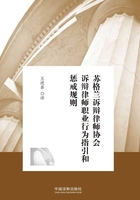
4.DUTIES IN RELATION TO THE INSTRUCTING AGENT
4.1 A corollary of the Advocate’s independence from the agent is the agent’s independence from the Advocate.An Advocate must respect the agent’s independence-in particular, his freedom to instruct Counsel of his choice and to change Counsel at any time without explanation or apology.(An Advocate may be asked by an agent to recommend the name of another Advocate to act as his junior, or as his senior, or to replace him if he is unable to act.There is no rule against doing so, but it is preferable that the agent should be given several names from which to make his own choice after consultation with Counsel’s clerk.)
4.2 An Advocate must also respect the fact that the agent’s relationship with the client is different from, and likely to be more continuing than, his own.He should do nothing, beyond what his professional duty requires, to upset the agent/client relationship or destroy the trust which the client has in the agent.
4.3 When an Advocate has reason to believe that an agent has been guilty of professional misconduct(as opposed to professional negligence, as to which see paragraph 5.1.3), he has a duty to the client, the Court and the profession to take appropriate action.If the matter comes to his knowledge in the course of proceedings in Court, it may be necessary to take immediate action, and if an adjournment is necessary for this purpose, it should be asked for.If the matter does not call for immediate action, Counsel should consult the Dean before making any formal complaint or report.
4.4 If an Advocate feels compelled to criticise the conduct of an agent in respect of something falling short of professional misconduct, he should avoid doing so in the presence of the client and should in any event ask the agent to explain what he has done and why before criticising his conduct.
4.5 An Advocate should carefully consider whether he should attend a consultation without his instructing solicitor or a representative of his firm being present.The presence of the solicitor or representative will protect both Counsel and the solicitor should a dispute arise later as to what advice Counsel gave or what instructions he was given by the client.In cases where difficult advice is given but not accepted, it may be wise to record the advice in writing.
4.6 If Counsel has to speak to the client without the solicitor being present, the solicitor should be told as soon as possible what transpired.
4.7 There is no rule against an Advocate going to an agent’s office to collect papers or to attend a consultation.Nor is there any rule which prevents an Advocate accepting a social invitation from an agent or giving such invitation to an agent.In doing so, however, the Advocate should bear in mind the considerations mentioned in preceding paragraphs.